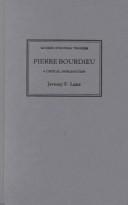| Listing 1 - 10 of 16 | << page >> |
Sort by
|

ISBN: 9780415646147 9780415363204 9780203013571 9781134228409 9781134228447 9781134228454 0203013573 0415646146 0415363209 Year: 2006 Volume: 22 Publisher: London: Routledge,
Abstract | Keywords | Export | Availability | Bookmark
 Loading...
Loading...Choose an application
- Reference Manager
- EndNote
- RefWorks (Direct export to RefWorks)
Political science --- Social sciences --- Neoliberalism --- Philosophy --- Bourdieu, Pierre, --- Political and social views --- Political and social views. --- Political science - Philosophy --- Social sciences - Philosophy --- Bourdieu, Pierre, - 1930-2002 - Political and social views --- Bourdieu, Pierre, - 1930-2002
Book
ISBN: 9780472036172 9780472118816 9780472029228 0472029223 9781299734593 1299734596 0472118811 0472036173 Year: 2013 Publisher: Ann Arbor, Mich. University of Michigan Press
Abstract | Keywords | Export | Availability | Bookmark
 Loading...
Loading...Choose an application
- Reference Manager
- EndNote
- RefWorks (Direct export to RefWorks)
A groundbreaking study of the reception of jazz among French-speaking black intellectuals between 1918 and 1945.
Guerre mondiale (1939-1945) --- Jazz --- Art et guerre --- Musique et guerre --- Music --- Sociology of culture --- anno 1910-1919 --- anno 1930-1939 --- anno 1940-1949 --- anno 1920-1929 --- France --- Art et guerre. --- Musique et guerre. --- Music and race --- World War, 1939-1945 --- History and criticism. --- History --- Music and the war.

ISBN: 1783718609 1783718846 9781783718603 0745315062 0074531506 1783718617 Year: 2000 Publisher: Pluto Press
Abstract | Keywords | Export | Availability | Bookmark
 Loading...
Loading...Choose an application
- Reference Manager
- EndNote
- RefWorks (Direct export to RefWorks)
Sociology --- History. --- Bourdieu, Pierre, --- Burdʹe, Pʹer, --- Burdʹe, P. --- Bourdieu, P. --- Pūrtiyu, Piyar,

ISBN: 9781594540387 1594540381 9791594540386 Year: 2004 Publisher: New York: Novinka Books,
Abstract | Keywords | Export | Availability | Bookmark
 Loading...
Loading...Choose an application
- Reference Manager
- EndNote
- RefWorks (Direct export to RefWorks)
This book lists hundreds of instances in which the United States has used its armed forces abroad in situations of military conflict or potential conflict or for other than normal peacetime purposes. It is intended primarily to provide a rough survey of past US military ventures abroad, without reference to the magnitude of the given instance noted. The listing often contains references, especially from 1980 forward, to continuing military deployments especially US military participation in multinational operations associated with NATO or the United Nations. Most of these post-1980 instances are summaries based on Presidential reports to Congress related to the War Powers Resolution. The instances differ greatly in number of forces, purpose, extent of hostilities, and legal authorisation. Eleven times in its history the US has formally declared war against foreign nations. These eleven US war declarations encompassed five separate wars: the war with Great Britain declared in 1812, the war with Mexico declared in 1846, the War with Spain declared in 1898, the First World War, during which the US declared war with Germany and with Austria-Hungary during 1917, World War II, during which the US declared war against Japan, Germany, and Italy in 1941, and against Bulgaria, Hungary, and Rumania in 1942.

ISBN: 0745315011 Year: 2000 Publisher: London : Pluto press,
Abstract | Keywords | Export | Availability | Bookmark
 Loading...
Loading...Choose an application
- Reference Manager
- EndNote
- RefWorks (Direct export to RefWorks)
Book
ISBN: 9783031598807 3031598806 Year: 2024 Publisher: Cham : Springer Nature Switzerland : Imprint: Palgrave Macmillan,
Abstract | Keywords | Export | Availability | Bookmark
 Loading...
Loading...Choose an application
- Reference Manager
- EndNote
- RefWorks (Direct export to RefWorks)
Jacques Rancière is almost unique amongst contemporary thinkers in his consistent hostility to sociologically informed modes of interpretation. This hostility is not limited to his detailed critiques of Pierre Bourdieu—it characterises his thinking about politics, emancipation, democracy, history, aesthetics, and social class; it extends into a rejection of Marxist or marxisant modes of analysis. For Rancière’s harshest critics, this hostility to sociology reflects an interpretative negligence on his part, an intellectual, political, or moral flaw. Even his more favorable commentators typically upbraid him for failing to specify the historical conditions of possibility of democratic emancipation. This book argues that such reactions are fundamentally mistaken and fail to grasp what is at stake in Rancière’s rejection of sociological modes of enquiry. This rejection is attributable neither to his negligence nor to some moral flaw, and nor is it merely incidental to his thought. On the contrary, Rancière understands sociology to constitute a problematic, a set of assumptions and interpretative procedures whose blind spots must be identified and thought through in order that the possibility of intellectual and political emancipation, of democracy, and of history can be thought at all. Rancière’s thought thus represents a counter-sociology and his rejection of the sociological problematic serves as the positive condition of possibility of his theory of democracy, equality, and emancipation. This new study both clarifies the nature of Rancière’s critique of the sociological problematic and shows what his counter-sociology allows him to think in the domains of politics, history, and education. Jeremy F. Lane is Professor of French & Critical Theory in the Department of Modern Languages & Cultures at the University of Nottingham, UK.
Continental Philosophy. --- Political science --- Critical theory. --- Political Philosophy. --- Critical Theory. --- Philosophy.
Book
ISBN: 0472029223 0472118811 0472036173 Year: 2013 Publisher: Ann Arbor : The University of Michigan Press,
Abstract | Keywords | Export | Availability | Bookmark
 Loading...
Loading...Choose an application
- Reference Manager
- EndNote
- RefWorks (Direct export to RefWorks)
Jazz --- Music and race --- World War, 1939-1945 --- Race and music --- Race --- Accordion and piano music (Jazz) --- Clarinet and piano music (Jazz) --- Cornet and piano music (Jazz) --- Double bass and piano music (Jazz) --- Jazz duets --- Jazz ensembles --- Jazz music --- Jazz nonets --- Jazz octets --- Jazz quartets --- Jazz quintets --- Jazz septets --- Jazz sextets --- Jazz trios --- Jive (Music) --- Saxophone and piano music (Jazz) --- Vibraphone and piano music (Jazz) --- Wind instrument and piano music (Jazz) --- Xylophone and piano music (Jazz) --- African Americans --- Music --- Third stream (Music) --- Washboard band music --- History and criticism. --- History --- Music and the war. --- Songs and music --- History and criticism
Multi

ISBN: 9781474463829 9780748647132 Year: 2022 Publisher: Edinburgh Edinburgh University Press
Abstract | Keywords | Export | Availability | Bookmark
 Loading...
Loading...Choose an application
- Reference Manager
- EndNote
- RefWorks (Direct export to RefWorks)
Book

ISBN: 9781474463829 Year: 2022 Publisher: Edinburgh
Abstract | Keywords | Export | Availability | Bookmark
 Loading...
Loading...Choose an application
- Reference Manager
- EndNote
- RefWorks (Direct export to RefWorks)
Book

ISBN: 9781474470926 Year: 2022 Publisher: Edinburgh
Abstract | Keywords | Export | Availability | Bookmark
 Loading...
Loading...Choose an application
- Reference Manager
- EndNote
- RefWorks (Direct export to RefWorks)
| Listing 1 - 10 of 16 | << page >> |
Sort by
|

 Search
Search Feedback
Feedback About UniCat
About UniCat  Help
Help News
News